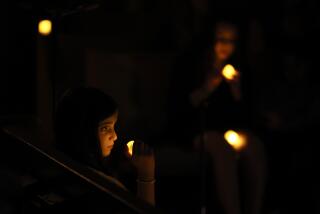Playing to All Faiths
NORTHRIDGE — Organist and pianist Bob Mitchell, 84, will soon be ending his 24 years at a Northridge synagogue, but that doesn’t mean he’s going to put his feet up and contemplate the sunsets.
Best known for his Mitchell Singing Boys, a choir whose movie credits stretch from 1936 to 1994, Mitchell still plays Sunday mornings at a Religious Science church in Redondo Beach and Sunday nights at an Italian Catholic parish in Chinatown.
So what is Mitchell’s religious allegiance? “I’m a nominal Roman Catholic,” he said at Temple Ahavat Shalom, the Reform synagogue that is honoring him with a dinner Dec. 6.
Many newcomers to the 700-family temple in Northridge assume that Mitchell is Jewish because he wears a yarmulke and prayer shawl and sings in Hebrew, which he taught himself when working for other synagogues.
“Once a gentleman in the congregation introduced his wife to me, adding that ‘she’s not of our faith,’ and another time a new member named Bob Mitchell told me, ‘It’s so unusual to meet another Jew with our name,’ ” Mitchell said with a smile.
Despite the common assumption of churchgoers and temple members, Mitchell said that longtime fixtures at congregations’ keyboards often are of a different faith or not religious at all--despite their familiarity with the liturgy.
“I’ve always learned from his creative musical ideas,” said Patti Linsky, the cantor at Ahavat Shalom. “He pulls chords out of the air, and for a silent meditation comes up with a mini-composition that works perfectly.”
In addition to his steady work at houses of worship, Mitchell has had career that includes movies, radio, television and four seasons as the Dodgers organist, starting in the 1960s when Dodger Stadium opened.
“That was a sweet job--no rehearsals and high pay,” he said.
*
Mitchell began performing before audiences in 1924, at age 12, when he played the organ to accompany silent movies in matinees at a Pasadena theater. He won music scholarships in New York state and earned degrees from London’s Trinity College and what is now Cal State Los Angeles. The American Guild of Organists made him a fellow at age 18, then the youngest to receive that honor, he said.
Not long after he became organist and choirmaster at St. Brendan Catholic Church in Los Angeles, Mitchell formed a boys choir in 1935 that also performed locally and on radio. In 1936, the Mitchell Singing Boys appeared in their first movie, “That Girl From Paris,” starring Lily Pons and Jack Oakie.
Over the years, the boys sang in more than 150 films, the latest being the soundtrack of the 1994 remake of “Miracle on 34th Street.”
At present, the choir is down to five boys, but it has been as large as 20. Their ages range from 9 to 14, and they receive their musical and academic training in a special private school in Hollywood.
Among the 800 or so alumni are members of the Sandpipers and the Lettermen, Steve Rossi (of Allen and Rossi) and arranger-conductor Alan Copeland.
The group’s most famous appearance was as orphans in “Going My Way,” the best-picture Oscar winner for 1944.
“Bing Crosby selected the boys to sing in several of his movies,” Mitchell said. At the time, Mitchell was serving in the Navy in the Pacific, although he was brought back in 1945 by Meredith Willson, who formed the Armed Forces Orchestra.
Discharged in 1946, Wilson returned to his prewar job as a staff organist and pianist at KFI radio, but also was involved in network radio with the likes of singer Mel Torme and the Hollywood Canteen.
Movie appearances continued with “The Jolson Story” (1946), starring Larry Parks, and “The Bishop’s Wife” (1947), starring Cary Grant.
During his broadcasting and live performance work in the postwar years, Mitchell continued playing on weekends at religious services as well as weddings, concerts and bar mitzvahs.
“The United Jewish Appeal in 1948 asked my choir to sing in Hebrew,” he said. “I went over to Fairfax Avenue and got some books to learn how to read and pronounce Hebrew.”
With his makeshift ability in Hebrew, Mitchell began substituting as an organist at Temple Emanuel of Hollywood, and later was a regular at Sinai Temple in Westwood.
*
Meanwhile, Mitchell was still playing at St. Brendan Catholic parish in central Los Angeles--a tenure that would last 55 years in all--and added duties at Good Shepherd Catholic Church in Beverly Hills, where he worked a total of 40 years. “I played for the funerals of Carmen Miranda and a lot of stars at the Beverly Hills parish,” he said.
At times, Mitchell brings his boys along for musical numbers at congregations where he plays. He has done the two Sunday morning services at the Redondo Beach of Religious Science for more than a dozen years, and when the boys came with him it meant getting up at 5:45 a.m. to squeeze in rehearsal time.
Mitchell said his will leaves the Mitchell Singing Boys enterprise and his home to Vincent Morton, who sang with the group in 1945 and has taken the boys on two overseas tours.
“He [Morton] can step right in,” said Mitchell. “He’s well able to play, direct and discipline the boys.”
*
Health permitting, Mitchell wants to continue with his other commitments.
Despite his years, he wasn’t eager to leave Temple Ahavat Shalom. Frankly speaking, he said, “I’m being laid off.” But he also conceded that he will be getting a generous pension.
Linsky, the temple’s cantor, said that synagogue leaders urged Mitchell to retire because they worry about his health and the long commute to Northridge from his home in Hollywood.
Mitchell has not been doing the Friday night services since July 1, but helped out during the High Holy Days in September and will be doing bar and bat mitzvahs until the end of this year.
In another job that brings Mitchell full circle to his earliest experiences, the organist plays every Wednesday night at the Silent Movie Theater on Fairfax Avenue in Hollywood.
There, he said, he finally saw last year Rudolph Valentino’s “The Sheik,” a silent film that was considered too risque for young Mitchell to see when he was playing at the old Strand Theater in Pasadena when it was a hit in the 1920s.
“I can see why they didn’t let me see it,” he said.
He also recalled that his father, an attorney, and his mother strongly disliked him playing the organ for silent movies. “They thought it was just the lowest form of trash,” he said.
In recent years, Mitchell has been invited more than once to campuses and interviewed by professors about his experiences in the silent film era.
“They are studying this now just like it was sacred scripture.”
More to Read
The biggest entertainment stories
Get our big stories about Hollywood, film, television, music, arts, culture and more right in your inbox as soon as they publish.
You may occasionally receive promotional content from the Los Angeles Times.










